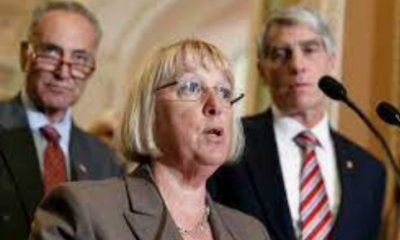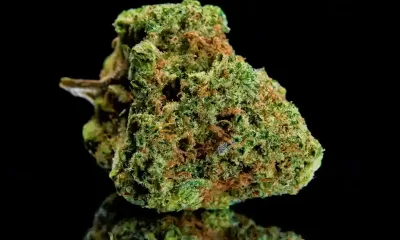Business
Is SAFE Banking Act Getting Closer To Passage? Senators Agree This Issue Is At Play

Rep. Ed Perlmutter said the SAFE Banking bill “obviously is a public safety issue. It is a tax issue. It is an issue of civil justice (…) We can get this done. We will get this done. We need some more Republican cosponsors.”
Sponsors of the Secure and Fair Enforcement (SAFE) Banking Act recently discussed the urgency of enacting cannabis reform this session, reiterating the public safety imperative of providing the industry access to the financial system.
Bipartisan and bicameral sponsors of banking reform said “it’s time to take action on the House-passed standalone legislation,” reported Marijuana Moment.
The National Cannabis Industry Association (NCIA) brought together more than 100 stakeholders for two days of lobbying on Capitol Hill involving more than 100 meetings with legislators and staff to advocate for the Cannabis Act Banking SAFE to be enacted in 2022.
Sen. Jeff Merkley (D-OR), the sponsor of the SAFE Banking Act, talked about violent crime targeting marijuana businesses and workers, as well as bipartisan support for stand-alone legislation. “It’s a political positive. It’s good policy and good politics,” Merkley said. “So we’re here today to say it’s way past time to get the SAFE Banking bill done.”

Recently, Merkley discussed the so-called “SAFE Banking Plus” bill at the Payments, Banking, and Compliance (PBC) Conference. “Every legal business deserves the same access to the same resources as any other—resources like bank accounts, loans, payment processing, and so much more,” Merkley separately said in a press release. “When it comes to cannabis, the country is changing fast and it’s long past time that our federal laws caught up.”
A Public Safety Issue
Rep. Ed Perlmutter (D-CO) said SAFE Banking bill “obviously is a public safety issue. It is a tax issue. It is an issue of civil justice (…) We can get this done. We will get this done. We need some more Republican cosponsors” that the congressman expects will join them soon.
“I know, in the House, that whatever they pass in the Senate, we will get passed in the House. And this will be law by the end of this year, with your help and your hard work,” Perlmutter added.
Sen. Steve Daines (R-MT), the GOP lead on the standalone legislation called the legislation “a public safety issue—when legal Montana cannabis businesses don’t have a way to safely conduct business and are forced to operate in all cash our communities become vulnerable to crime.”
The SAFE Banking Act has passed in the House seven times but has not moved in the Senate.
What Do Minnesota’s Senators Think About This Issue?
GOP Minnesota Sen. Carla Nelson and DFL challenger Aleta Borrud debated cannabis legalization for recreational purposes, among other issues including health care, election integrity, guns and abortion.
Nelson, who has served in the Minnesota Senate since 2010, beat Borrud in a close race 50.9% to 49%, reported Yahoo News.
When senators were asked if they support the legalization of cannabis for recreational purposes, they expressed themselves as follows:
“I absolutely do support the legalization of cannabis. Cannabis has been used for millennia, and people in our community are using it. People should not be going to jail, especially our Black and brown neighbors going to jail for using it. It becomes an issue of equity. If we legalize it, we can regulate it and improve its safety,” said Borrud.

“I’ve heard concern from law enforcement about the packaging of gummies that are now for sale. I think we have to make sure that these are not falling into the hands of our kids.”
On the other hand, Nelson expressed that she has the endorsement from the Minnesota Police and Peace Officers Association. “And I will tell you what our public safety officials all say in this regard. Until there is a field sobriety test, it is irresponsible to legalize marijuana for the broader population,” she continued.
Adult-Use Cannabis Legalization Means Social Justice
According to the latest data from the Bureau of Criminal Apprehension, Black Minnesotans are nearly five times more likely to be arrested on marijuana charges than whites.
“In 2021 there were 6,055 marijuana arrests in the state,” according to BCA’s latest data. Cannabis accounted for a little over one-third of all Minnesota drug arrests. “Close to 90% of marijuana arrests in Minnesota are for simple possession, rather than sales or distribution.”
Business
New Mexico cannabis operator fined, loses license for alleged BioTrack fraud

New Mexico regulators fined a cannabis operator nearly $300,000 and revoked its license after the company allegedly created fake reports in the state’s traceability software.
The New Mexico Cannabis Control Division (CCD) accused marijuana manufacturer and retailer Golden Roots of 11 violations, according to Albuquerque Business First.
Golden Roots operates the The Cannabis Revolution Dispensary.
The majority of the violations are related to the Albuquerque company’s improper use of BioTrack, which has been New Mexico’s track-and-trace vendor since 2015.
The CCD alleges Golden Roots reported marijuana production only two months after it had received its vertically integrated license, according to Albuquerque Business First.
Because cannabis takes longer than two months to be cultivated, the CCD was suspicious of the report.
After inspecting the company’s premises, the CCD alleged Golden Roots reported cultivation, transportation and sales in BioTrack but wasn’t able to provide officers who inspected the site evidence that the operator was cultivating cannabis.
In April, the CCD revoked Golden Roots’ license and issued a $10,000 fine, according to the news outlet.
The company requested a hearing, which the regulator scheduled for Sept. 1.
At the hearing, the CCD testified that the company’s dried-cannabis weights in BioTrack were suspicious because they didn’t seem to accurately reflect how much weight marijuana loses as it dries.
Company employees also poorly accounted for why they were making adjustments in the system of up to 24 pounds of cannabis, making comments such as “bad” or “mistake” in the software, Albuquerque Business First reported.
Golden Roots was fined $298,972.05 – the amount regulators allege the company made selling products that weren’t properly accounted for in BioTrack.
The CCD has been cracking down on cannabis operators accused of selling products procured from out-of-state or not grown legally:
- Regulators alleged in August that Albuquerque dispensary Sawmill Sweet Leaf sold out-of-state products and didn’t have a license for extraction.
- Paradise Exotics Distro lost its license in July after regulators alleged the company sold products made in California.
Golden Roots was the first alleged rulebreaker in New Mexico to be asked to pay a large fine.
Source: https://mjbizdaily.com/new-mexico-cannabis-operator-fined-loses-license-for-alleged-biotrack-fraud/
Business
Marijuana companies suing US attorney general in federal prohibition challenge

Four marijuana companies, including a multistate operator, have filed a lawsuit against U.S. Attorney General Merrick Garland in which they allege the federal MJ prohibition under the Controlled Substances Act is no longer constitutional.
According to the complaint, filed Thursday in U.S. District Court in Massachusetts, retailer Canna Provisions, Treevit delivery service CEO Gyasi Sellers, cultivator Wiseacre Farm and MSO Verano Holdings Corp. are all harmed by “the federal government’s unconstitutional ban on cultivating, manufacturing, distributing, or possessing intrastate marijuana.”
Verano is headquartered in Chicago but has operations in Massachusetts; the other three operators are based in Massachusetts.
The lawsuit seeks a ruling that the “Controlled Substances Act is unconstitutional as applied to the intrastate cultivation, manufacture, possession, and distribution of marijuana pursuant to state law.”
The companies want the case to go before the U.S. Supreme Court.
They hired prominent law firm Boies Schiller Flexner to represent them.
The New York-based firm’s principal is David Boies, whose former clients include Microsoft, former presidential candidate Al Gore and Elizabeth Holmes’ disgraced startup Theranos.
Similar challenges to the federal Controlled Substances Act (CSA) have failed.
One such challenge led to a landmark Supreme Court decision in 2005.
In Gonzalez vs. Raich, the highest court in the United States ruled in a 6-3 decision that the commerce clause of the U.S. Constitution gave Congress the power to outlaw marijuana federally, even though state laws allow the cultivation and sale of cannabis.
In the 18 years since that ruling, 23 states and the District of Columbia have legalized adult-use marijuana and the federal government has allowed a multibillion-dollar cannabis industry to thrive.
Since both Congress and the U.S. Department of Justice, currently headed by Garland, have declined to intervene in state-licensed marijuana markets, the key facts that led to the Supreme Court’s 2005 ruling “no longer apply,” Boies said in a statement Thursday.
“The Supreme Court has since made clear that the federal government lacks the authority to regulate purely intrastate commerce,” Boies said.
“Moreover, the facts on which those precedents are based are no longer true.”
Verano President Darren Weiss said in a statement the company is “prepared to bring this case all the way to the Supreme Court in order to align federal law with how Congress has acted for years.”
While the Biden administration’s push to reschedule marijuana would help solve marijuana operators’ federal tax woes, neither rescheduling nor modest Congressional reforms such as the SAFER Banking Act “solve the fundamental issue,” Weiss added.
“The application of the CSA to lawful state-run cannabis business is an unconstitutional overreach on state sovereignty that has led to decades of harm, failed businesses, lost jobs, and unsafe working conditions.”
Business
Alabama to make another attempt Dec. 1 to award medical cannabis licenses

Alabama regulators are targeting Dec. 1 to award the first batch of medical cannabis business licenses after the agency’s first two attempts were scrapped because of scoring errors and litigation.
The first licenses will be awarded to individual cultivators, delivery providers, processors, dispensaries and state testing labs, according to the Alabama Medical Cannabis Commission (AMCC).
Then, on Dec. 12, the AMCC will award licenses for vertically integrated operations, a designation set primarily for multistate operators.
Licenses are expected to be handed out 28 days after they have been awarded, so MMJ production could begin in early January, according to the Alabama Daily News.
That means MMJ products could be available for patients around early March, an AMCC spokesperson told the media outlet.
Regulators initially awarded 21 business licenses in June, only to void them after applicants alleged inconsistencies with how the applications were scored.
Then, in August, the state awarded 24 different licenses – 19 went to June recipients – only to reverse themselves again and scratch those licenses after spurned applicants filed lawsuits.
A state judge dismissed a lawsuit filed by Chicago-based MSO Verano Holdings Corp., but another lawsuit is pending.
Source: https://mjbizdaily.com/alabama-plans-to-award-medical-cannabis-licenses-dec-1/
-

 Business2 years ago
Business2 years agoPot Odor Does Not Justify Probable Cause for Vehicle Searches, Minnesota Court Affirms
-

 Business2 years ago
Business2 years agoNew Mexico cannabis operator fined, loses license for alleged BioTrack fraud
-

 Business2 years ago
Business2 years agoAlabama to make another attempt Dec. 1 to award medical cannabis licenses
-

 Business2 years ago
Business2 years agoWashington State Pays Out $9.4 Million in Refunds Relating to Drug Convictions
-

 Business2 years ago
Business2 years agoMarijuana companies suing US attorney general in federal prohibition challenge
-

 Business2 years ago
Business2 years agoLegal Marijuana Handed A Nothing Burger From NY State
-

 Business2 years ago
Business2 years agoCan Cannabis Help Seasonal Depression
-

 Blogs2 years ago
Blogs2 years agoCannabis Art Is Flourishing On Etsy













